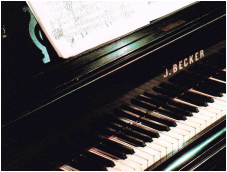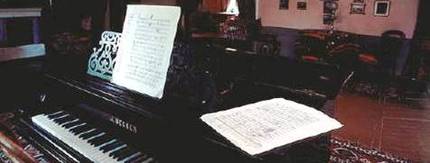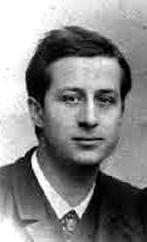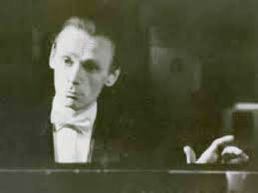 Tchaikovsky's piano at Klin
Tchaikovsky's piano at Klin
If you are fortunate enough to circulate among people who discuss pianists, there are times you might hear someone say "She/he will perform the Tchaikovsky," or "Yes, I heard him/her play the Tchaikovsky." And what they will mean by "the Tchaikovsky" is the Piano Concerto No. 1, famous and ubiquitous and more than deserving of its fame and popularity.
But there are three concertos, not to mention the delightful Concert Fantasia. The second was Tchaikovsky's favorite however, and a work that he considered to be among his best, in spite of the angst it gave him later. He undertook its composition in 1879, at a time when he found himself at his sister's home in Kamenka with no pressing obligations and consequently feeling rather spiritless. At that time he wrote to his brother Modest complaining that he was experiencing
a certain vague dissatisfaction with myself, an over-frequent and almost irresistible desire to sleep, a certain emptiness, and finally boredom. There were times when I didn't know what to do with myself. Finally yesterday it became fully apparent to me what was the matter. I had to get on with something: I find myself absolutely incapable of living long without work. Today I began to create something and the boredom vanished as if by magic.
 The Piano at Tchaikovsky's home in Klin - Now the Tchaikovsky Museum
The Piano at Tchaikovsky's home in Klin - Now the Tchaikovsky Museum
In almost every instance and in almost every genre, Tchaikovsky staked out his own grounds for creating a work and did it on his own terms. His first symphony, Winter Daydreams, wrenched the european model out of what-was-to-be-expected-in-a-symphony into a new Russian symphonic language. Tchaikovsky could easily have written a cello concerto in its "accepted" more academic form, but he hewed to his own vision and created Variations on a Rococo Theme, without doubt a fresh take, scattering expectations, and making it new. And he not only changed the world of ballet music, he transmogrified it. His second piano concerto is in the same mold.
 Aleksandr Ziloti
Aleksandr Ziloti
One of the most egregious cuts was the evisceration of the "trio" section to the Andante at the beginning of the second movement. The original version, which is often called the "trio" movement, is one of Tchaikovsky's most beautiful inventions. Following a short orchestral prelude, a single violin introduces an achingly mournful and melancholy melody, shortly joined by a single cello further unfurling the melody, and only then does the piano join them and the orchestra, and for a time this piano concerto becomes nothing less than a triple concerto. A courageous (and unorthodox) invention on the part of Tchaikovsky, and another mark of his musical genius. The judgment of history is that Tchaikovsky was correct in his original vision ─ and Ziloti has been proven wrong.
 Igor Zhukov
Igor Zhukov
(One of the finest interpretations of the original Andante is with Igor Zhukov, pianist; Mikhail Tcherniakhovsky, violin; and Viktor Simon, cello with Gennady Rozhedestvensky conducting the USSR RTV Large Symphony Orchestra*.)
Tchaikovsky's Piano Concerto No. 2 has been overlooked, underperformed, and a sad victim of musical meddling. It is by every measure a monumental work, and is every bit as deserving of attention as his more famous First. If more orchestras and soloists can be persuaded to bring this concerto to the fore, perhaps someday those conversations among music lovers will have to differentiate, favorably, and no one will be able again to say, "We went to hear the Tchaikovsky" without needing to clarify their statement because Tchaikovsky's Piano Concerto No. 2 will have taken its rightful place among the greatest works ever written for Piano and Orchestra.
 RSS Feed
RSS Feed